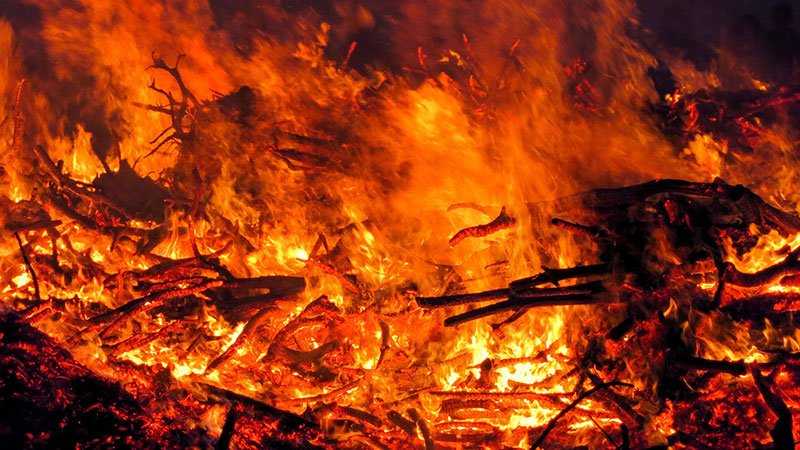
Thousands of military men and women have served on bases in Iraq and Afghanistan where the air was cloudy with burn pit smoke. Many of us have been around small campfires burning newspapers and wood. But everything from dead animals to human waste fuels the burn pit fires in the Middle East, married with jet fuel as an accelerant.
At the height of the war in Iraq, many bases (like Joint Base Balad, a 15-square-mile settlement north of Baghdad) were like makeshift cities, complete with restaurants, movie theatres, and shopping centers. But all cities produce garbage, and unfortunately for many service members living in these sizable outposts, the easiest way for the military to handle refuse was through 24-hour fires smoldering in giant pits within walking distance of living quarters.
But these fires didn’t only affect those living next to them. If you were on garbage detail, it was your job to feed these pits with food waste, motor oil, tires, unusable uniforms, and even amputated body parts. And the smoke didn’t immediately dissipate as it rose into the air – it hung heavy above the entire outpost like a storm cloud threatening rain.
Because the health hazards of these giant burn pits were not understood until after many soldiers returned home, complaints raised about the constant stench and polluted air were met with indifference by officers. And many didn’t even think about the possible ill effects of inhaling thick, black smoke every minute of their lives. Even if they did, they couldn’t have imagined that it would be the source of lung cancer or severe respiratory problems. They couldn’t have known that it would cause their untimely deaths, leaving their spouses and children alone with medical bills they had no way of paying.
Some have compared today’s burn pits to the Vietnam War’s Agent Orange. While the VA has addressed some of the illnesses caused by Agent Orange by enacting legislation that provides presumptive conditions to those veterans who served in Vietnam, there is no similar legislation for veterans who were exposed to burn pit smoke in Iraq and Afghanistan.
And it’s not as if the Pentagon had no idea these pits were dangerous. In 1978, the Department of Defense’s waste management guidance said that solid waste should not be burned in open pits if an alternative is available. But burn pits are cheaper than other alternatives, as they only require initial setup and little to no monitoring – especially before comprehensive standards were put in place governing what could and could not be burned in 2009. Today, Congress’ Airborne Hazards and Open Burn Pit Registry has more than 90,000 entries from veterans and service members who reported health concerns through online questionnaires.
One of the problems is the lack of documentation. Any recent efforts to investigate burn pits are stalled for a lack of funding. And even if one did go digging through military records, there would be very few to be found; the military didn’t collect information on what was burned in each pit, or even if and when they were used. A list of active pits was not kept until 2010, long after much of the damage was already done. Of course, bookkeeping can be difficult during a war, but Dr. Cecile Rose, a researcher at National Jewish Hospital, has posited that some military officials have made efforts to keep this information secret. “Frankly,” he says, “the likelihood that we will be able to really pin it down, what’s causing these soldiers to get sick, is extremely unlikely.”
Veterans are dying at a much faster rate from what is believed to be exposure to the thick, black smoke, so they don’t have time for these issues to be litigated the way Agent Orange was. Several service members have returned home from active duty only to learn within months that they have terminal illnesses. Many have not received the medical care or financial assistance they need for the new challenges they face. Many have already died.
As the general public is fast becoming aware of veteran illness caused by burn pits, pressure is mounting on the VA. The Airborne Hazards and Open Burn Pit Registry questionnaire first included dozens of questions about non-combat exposures like smoking, working in dusty offices, or dangerous hobbies, apparently trying to shift the blame onto other sources. But a more recent draft of the survey has been amended to remove some of these deflective questions.
If you believe you have a health condition related to exposure to burn pit smoke, please call Berry Law at (888) 883-2483 or contact us online. Our experienced team of veterans law attorneys can help you receive the benefits you deserve.
Our monthly newsletter features about important and up-to-date veterans' law news, keeping you informed about the changes that matter.